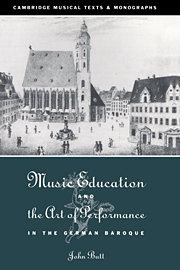Book contents
- Frontmatter
- Contents
- List of plates
- Preface
- Acknowledgements
- List of abbreviations
- 1 The establishment of Lutheran musical practice in the sixteenth century
- 2 The role of practical music in education c. 1600-1750
- 3 The contents, layout and style of instruction books
- 4 The development of performance practice and the tools of expression and interpretation in the German Baroque
- 5 Ornamentation and the relation between performer and composer
- 6 The decline of the Lutheran cantorates during the eighteenth century
- Notes
- Bibliography
- Index
2 - The role of practical music in education c. 1600-1750
Published online by Cambridge University Press: 03 December 2009
- Frontmatter
- Contents
- List of plates
- Preface
- Acknowledgements
- List of abbreviations
- 1 The establishment of Lutheran musical practice in the sixteenth century
- 2 The role of practical music in education c. 1600-1750
- 3 The contents, layout and style of instruction books
- 4 The development of performance practice and the tools of expression and interpretation in the German Baroque
- 5 Ornamentation and the relation between performer and composer
- 6 The decline of the Lutheran cantorates during the eighteenth century
- Notes
- Bibliography
- Index
Summary
The Lutheran Reformation not only fostered an immediate growth of musical activity in church and school, it also nurtured the further expansion and richness of music during the seventeenth century, the seemingly delayed fulfilment of Luther's desire to place the art as second only to theology in cultural and educational life. The reasons for this delay – if the Lutheran musical achievements of the sixteenth century may provisionally be disparaged thus – perhaps lie in the dislocation of the various historical processes. First, although Luther himself believed in promoting music at both elementary and specialised levels, the emphasis initially lay with the elementary, since the chorales and their melodies were so important for the dissemination of the new confession. Secondly, despite Luther's enthusiasm for music as a practical art, schools still retained a respect for music in its ancient role as a component of the Mediaeval quadrivium, music as a science of proportion and number which mirrored the order of creation. Thus cantors in the newly established Lutheran foundations were primarily academics (teaching other subjects in addition to music) who were not necessarily eminent ‘practical’ composers and performers, and who might have considered the position of cantor as a stepping-stone towards a post as rector (head of the school), pastor, or university professor. Furthermore, other teachers on the staff at Latin schools were often musically proficient, assisting in church services and taking the lower music classes in the school.
- Type
- Chapter
- Information
- Publisher: Cambridge University PressPrint publication year: 1994



